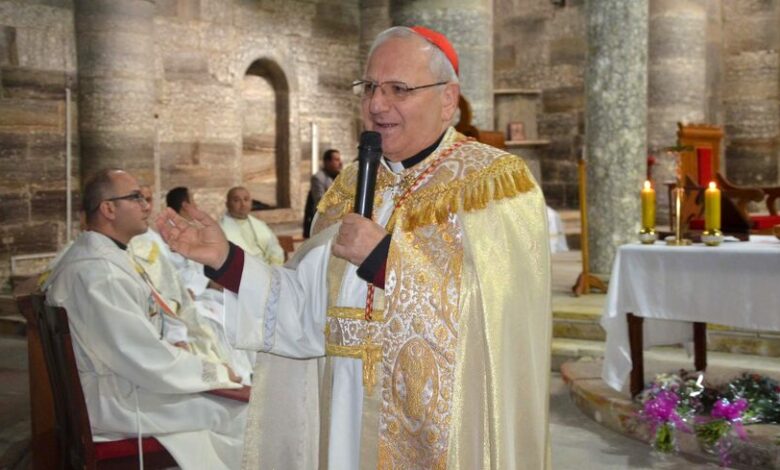Inside Iraq’s Chaldean Catholic Church Battle With Iran-backed Christian Group

A dispute between the Iraqi government and the Chaldean Catholic Church has prompted the church’s patriarch to move from Baghdad to the Kurdistan Region, and is inflaming tensions with the United States.
The issue relates to Iraqi President Abdul Latif Rashid revoking a decree that codified the patriarch’s management of the community endowment, as well as the escalating battle between the church and an Iran-backed Iraqi Christian leader.
On July 3, Rashid revoked a 2013 decree that recognised Patriarch Louis Sako as head of the Chaldean Catholic Church and allowed the religious leader to administer the community’s endowment. Rashid said the decree had no constitutional basis, according to Agence France-Presse.
The Chaldean Catholic Church is based in Iraq and is in communion with Rome. Iraq’s Aramaic-speaking Christians are divided into communities identifying as Chaldean, Assyrian and Syriac. Sako is based in Baghdad, though the majority of Christians now live in the northern Nineveh province and the autonomous Kurdistan Region.
The Chaldeans, Assyrians, and Syriacs form one of the oldest Christian communities in the world. There were around 1.5 million Christians in Iraq before the US invasion in 2003, but the population has since dwindled to around 150,000. The community faced several attacks in the chaos following the war, most notably by the Islamic State (IS) in 2014.
Rashid’s revocation follows a months-long war of words between Sako and Rayan al-Kaldani, the head of the Babylon Movement armed group and political party. The Babylon Movement was founded in 2014 to fight IS alongside the predominantly Shiite groups in the Popular Mobilisation Units (PMU). Babylon has been accused of illegal land seizures in the Nineveh province and corruption.
During Iraq’s most recent elections in 2021, the Babylon Movement won four of the five seats allocated to Christians in the Iraqi parliament. A 2021 report from Chatham House noted that some of the Babylon Movement’s voters are actually Shiite Muslims from southern Iraq.
The revocation of the decree has led to an ongoing controversy in Iraq. Last week, there was a protest in the predominantly Christian town of Ankawa in the Kurdistan Region against the move, the Kurdish news outlet Rudaw reported.
On Saturday, the Chaldean Patriarchate published an open letter from Sako announcing that he is moving from Baghdad to a monastery in the Kurdistan Region because of “the deliberate and humiliating campaign led by the Babylon Brigades.”
The same day, Kaldani issued a statement clarifying that the Babylon Movement is a “political movement” and not “brigades,” as Sako described them. He also said, “We confirm that the decision to revoke the decree was a decision of the republic’s presidency, not Babylon’s.”
On Monday, Rashid met with the head of the Vatican Embassy in Iraq, Father Charles Ssuuna.
“The Holy See does not have any observations or objections regarding the procedures of the Presidency of the Republic,” said Ssunna, according to a statement from the presidency.
However, the Vatican Embassy in Baghdad also issued a statement on Monday, saying it “regrets the misunderstandings and inappropriate dealings concerning the role of … Sako as the custodian of the properties of the Chaldean Church,” according to Reuters.
Rashid also tweeted on Monday that his decision “is not an attack” on the Chaldean Church, adding that it “does not impact His Eminence’s (Sako’s) status or ability to conduct his duties.”
The Vatican embassy in Washington did not respond to Al-Monitor’s request for comment. The Iraqi embassy was unable to comment before publication.
The revocation is only the latest setback to befall Iraqi Christians since 2003. The Chaldean Catholic Church is one of the most prominent churches in Iraq, and the issue has led to significant concern in the wider Christian community.
